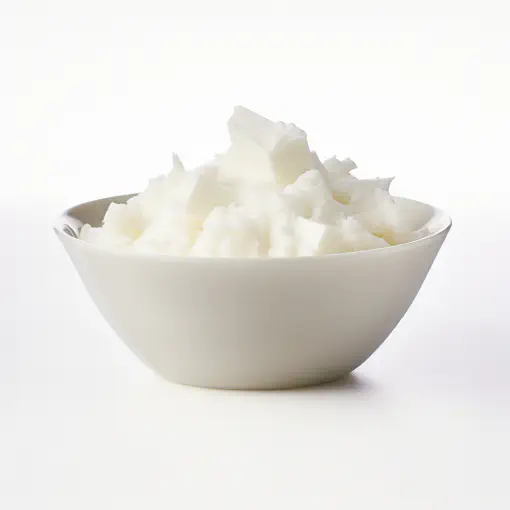Coconut wax is a natural wax derived from the oil of coconuts, known for its clean and slow burn in candle making, often considered a sustainable alternative to other waxes. It is prized for its eco-friendly characteristics and ability to hold fragrance well.
Characteristics
-
Natural Origin:
Coconut wax is derived from the oil of coconuts, making it a natural and renewable resource.
-
Clean and Slow Burn:
Known for providing a clean and slow burn in candles, contributing to a longer-lasting and more efficient performance.
-
Sustainable Option:
Considered a sustainable alternative to other waxes, as coconuts are a readily available and renewable crop.
-
Odorless:
Coconut wax is often odorless, allowing it to carry and enhance the fragrance of added essential oils or scents in candle making.
-
Biodegradable:
Being plant-based, coconut wax is biodegradable, aligning with environmentally friendly practices.
-
Smooth Texture:
It has a smooth and creamy texture, enhancing its suitability for various applications in the cosmetic and candle industries.
-
Low Shrinkage:
Exhibits low shrinkage during the cooling process, contributing to a consistent and even surface in candles.
-
Easy to Work With:
Coconut wax is pliable and easy to work with, facilitating the production of candles and cosmetic products.
-
Blending Capability:
Easily blends with other waxes and additives, allowing for customization of properties in formulations.
-
Eco-Friendly Packaging:
Often used in eco-friendly packaging due to its renewable nature, appealing to environmentally conscious consumers.
Applications
-
Candle Making:
Coconut wax is often used as an alternative to traditional waxes like paraffin or soy in candle making. It has a clean and slow burn, producing less soot and smoke compared to some other waxes. The wax has a natural coconut scent that can enhance the fragrance of scented candles.
-
Cosmetics and Personal Care Products:
Coconut wax can be found in the formulation of certain cosmetics and personal care items like lip balms, creams, and lotions. Its moisturizing properties make it suitable for products designed to hydrate and soften the skin.
-
Massage Candles:
Due to its low melting point and skin-friendly properties, coconut wax is used in massage candles. The melted wax from these candles can be used as a warm massage oil.
-
Food Industry:
Coconut wax is sometimes used as a coating for fruits and vegetables to extend their shelf life and protect them from external factors.
-
Wood Polishes:
Coconut wax is a natural alternative in the formulation of wood polishes, providing a protective and shiny coating for wooden surfaces.
-
Leather Conditioning:
In some cases, coconut wax is used in the formulation of leather conditioners to enhance the suppleness and appearance of leather products.
-
Art and Craft:
Artists and crafters may use coconut wax for various projects, such as creating wax seals, sculptures, or as a medium in encaustic painting.
-
Textile Industry:
Coconut wax can be used in the textile industry as a coating for fabrics to make them more water-resistant.
-
Natural Insect Repellent:
In some formulations, coconut wax may be combined with essential oils to create natural insect-repelling candles or products.
-
Adhesives and Sealants:
Coconut wax, in some cases, can be used as a component in the production of natural adhesives and sealants.
It’s important to note that the specific applications of coconut wax can vary based on its formulation and purity. Additionally, as consumer demand for natural and sustainable products continues to grow, coconut wax is likely to find new applications in various industries.
